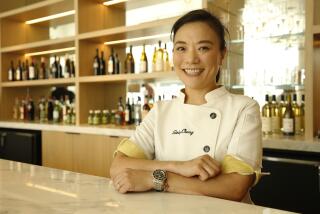Lucie Cheng dies at 70; UCLA sociologist ‘revolutionized’ Asian American studies
Lucie Cheng, a UCLA sociologist whose imaginative scholarship on Chinese Americans and other Asian immigrants helped propel the field of Asian American studies in new directions, examining such issues as class and gender in immigrant societies, died Jan. 27 in Taipei. She was 70 and had battled cancer for several years, a UCLA spokeswoman said.
Cheng was director of UCLA’s Asian American Studies Center from 1972 to 1987 and founding director of its Center for Pacific Rim Studies, which opened in 1985. Under her leadership, the university developed a highly regarded master’s program in Asian American studies as well as groundbreaking academic exchange programs with China.
“She revolutionized Asian American studies. . . . She helped create it as a serious discipline,” said Edna Bonacich, a UC Riverside professor emeritus of sociology and ethnic studies, who knew Cheng for 30 years.
Cheng also was an early advocate of broadening the field to examine issues involving not only immigrants from China but also from Korea, Southeast Asia and India. She was “transnational” not only in her approach to Asian American studies but in her own life, “as much at home here in the U.S. as in China and Taiwan,” said Paul Ong, a UCLA professor of urban planning, social welfare and Asian American studies.
After leaving UCLA in the mid-1990s, Cheng returned to Taipei, where she grew up, to become founding dean of Shih Hsin University’s Graduate School for Social Transformation Studies. She also became publisher of an independent newspaper in Taiwan and promoted efforts to improve media literacy there.
Cheng was born in Hong Kong on Feb. 11, 1939, and lived in Beijing for a few years before settling with her family in Taiwan, where she attended Taipei First Girls’ High School and National Taiwan University.
She crossed the Pacific to study at the University of Hawaii, where she earned a bachelor’s in sociology in 1962, followed by master’s degrees in library science in 1964 and sociology in 1968, and a doctorate in sociology in 1970.
In 1972, two years after joining the UCLA faculty as an assistant professor, she became the first permanent director of the Asian American Studies Center. She hired many of its key faculty members, developed its master’s program and helped establish an endowed chair in Japanese American studies.
One of her most notable scholarly achievements was an innovative study of 19th century Chinese American prostitutes, “Free, Indentured, and Enslaved: Chinese Prostitutes in 19th Century America,” published in 1979 in the journal Signs.
Based largely on a painstaking examination of census data from the San Francisco area during the Gold Rush era, it brought new insights about the Chinese women who journeyed to California that reflected a feminist sensibility as well as Cheng’s “deeper understanding of both Chinese culture and migration theory,” said Don Nakanishi, a UCLA political scientist and current director of the Asian American Studies Center.
Among Cheng’s findings was that many of the women who arrived about 1849 became sex entrepreneurs, who controlled whatever wealth they accumulated through prostitution and used the capital to open businesses in the United States or China.
Challenging a widely held belief that all Chinese prostitutes were slaves, she offered the example of a 20-year-old Hong Kong woman who within two years of her arrival in 1848 made enough money to buy a brothel that served a non-Chinese clientele. The woman later retired from the business and married a wealthy Chinese man.
But Cheng also found that such free agentry was short-lived. After 1854, most female Chinese immigrants were exploited as sex workers, victimized both by white racism and Chinese patriarchy.
“She was the first scholar to write anything about the women” in the early Chinese American community, Bonacich said.
“She took on this very controversial, embarrassing issue of prostitution and brought it into the light. . . . and was able to do a brilliant analysis of how it all worked from a political economy point of view.”
After Cheng’s father, Cheng She-Wo, died in 1991, she took over as publisher and editor of the newspaper he founded, Lih Pao Daily, and wrote provocative columns on women and labor.
She taught Western journalism principles at Shih Hsin University, also started by her father, and established the Cheng She-Wo Institute for Chinese Journalism there.
Cheng is survived by a brother, Si-Wei Cheng; a sister, Chia-lin Cheng; a niece and a nephew.
More to Read
Start your day right
Sign up for Essential California for the L.A. Times biggest news, features and recommendations in your inbox six days a week.
You may occasionally receive promotional content from the Los Angeles Times.







